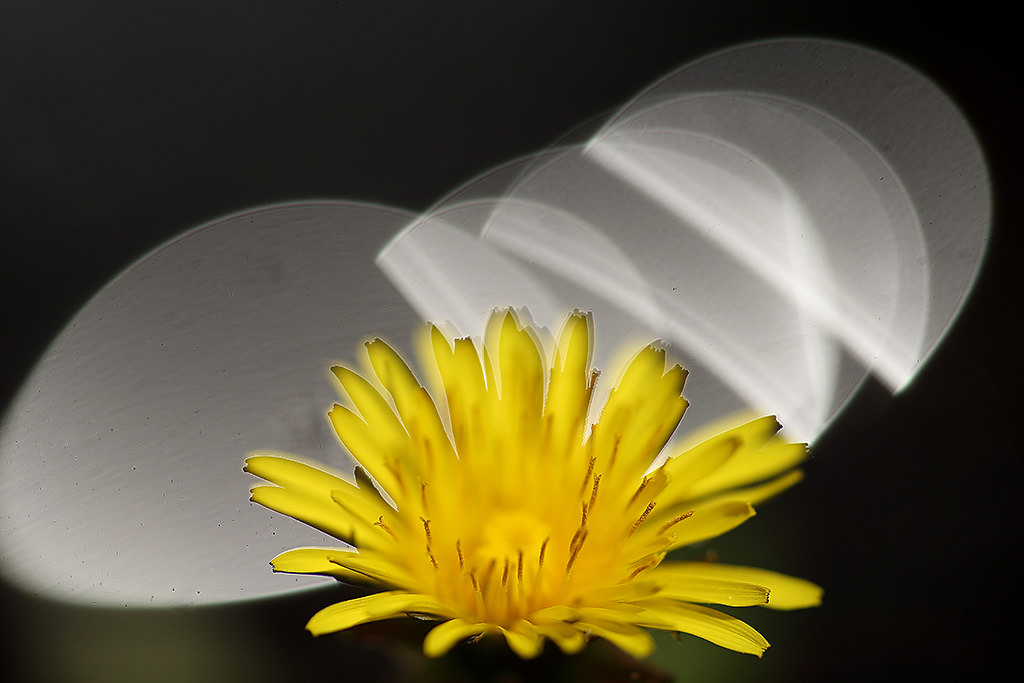Photographing Flowers: How to Create Brilliant Bokeh Circle Spotlights with a Macro Lens
Bokeh circles were created from the sparkling reflections on the lake in the background to add a special touch to this close-up shot of a dandelion flower in bloom by the lake, taken with a macro lens. Let’s take a look at what techniques were used. (Reported by: Shinichi Eguchi)

Large bokeh circles can be created from backlight reflecting off object edges

EOS-1D X/ EF180mm f/3.5L Macro USM/ FL: 180mm/ Aperture-priority AE (f/3.5, 1/1,250 sec., EV+0.7)/ ISO 100/ WB: Cloudy
A dandelion flower near the water caught my eye, and I closed up on it with my 180mm macro lens. Instead of using multiple exposure shooting since the petals were defocused, I created bokeh circles from the reflections on the water surface in the background.
I thought of capturing a close-up shot that would portray the forlorn nature of this lone dandelion flower I found on the banks of a lake. The edges of the dandelion and the water surface sparkled as they reflected the backlight—ideal conditions for creating bokeh circles. Once I was sure that bokeh circles could be created, I decided on my shooting position and angle.
To learn more about bokeh circles and how to create them, read:
4 Easy Steps to Capture Those Elusive Bokeh Circles!
Equipment and settings
Lens: I chose a 180mm telephoto macro lens so I could create a large bokeh with the background light and capture the details of the flower with a soft bokeh effect.
Aperture: I used the maximum aperture setting of f/3.5
Point of focus: On the dandelion
Other equipment: I shot by hand, but if you are worried about camera shake especially in view of the long focal length, a tripod could also come in handy.
Other considerations: Considering the balance of the overall image as I examined the framing, I settled on my first shot after taking several portrait and landscape shots. The area underneath the circular bokeh is black and underexposed only because the water surface was dark.
I made it a point to shoot from where the leaves glitter
On the day of the shoot, the clear sky and calm winds created a controlled environment. Many fallen leaves were floating on the water near the banks of the lake and their edges were glittering; among the grass near the water was the single dandelion flower in bloom. The dandelion and camera were about 70cm to 80cm apart, and the dandelion was about 1m away from the water surface.

Tip 1: The shape of the bokeh effect from light changes with the f-number
At f/3.5, the bokeh circles turned out perfectly round, but looked more like an octagonal bokeh at f/11.

f/3.5
EOS-1D X/ EF180mm f/3.5L Macro USM/ FL: 180mm/ Aperture-priority AE (f/3.5, 1/250 sec., EV+0.7)/ ISO 200

f/11
EOS-1D X/ EF180mm f/3.5L Macro USM/ FL: 180mm/ Aperture-priority AE (f/11, 1/25 sec., EV+0.7)/ ISO 200
Tip 2: You can layer the bokeh circles so that they look like spotlights

EOS-1D X/ EF180mm f/3.5L Macro USM/ FL: 180mm/ Aperture-priority AE (f/3.5, 1/400 sec., EV+0.7)/ ISO 100/ WB: Auto
This work is inspired by forget-me-nots that flower by the water. I achieved the pattern of bokeh circles from the background light by layering several reflections on the rippled water surface, so the flower looks like it is illuminated with spotlights.
For more tips on capturing bokeh circles, check out:
Lens FAQ #8: Where Should I Focus On to Capture Beautiful Bokeh Circles?
Working with the lens: Close up on subject and defocus
A macro lens is best for capturing small dandelions up close like the photo at the top of this article.
Macro lenses come in three types: standard, mid-telephoto and telephoto. Each type has a different focal length. The closer you get to the telephoto end, the softer the bokeh effect looks. You will get the same soft-looking bokeh effect when taking a close-up shot at a certain level of magnification, regardless of which of these types of lenses you use; however, when shooting your main subject from a distance, there will be a big difference in the bokeh effect.
The telephoto macro lens EF180mm f/3.5L Macro USM is a star choice when you want to shoot your main subject with a soft look, or bring order to a busy background using bokeh.
For more ideas on photographing flowers, check out:
Flower Photography – Composition and Camera Features
To learn about other cool effects you can create with macro lenses, read:
Macrophotography: Creating An Elegant Ombre Background with f/2.8 Lens
Macro Lens Techniques: Brilliantly Capture the Sparkle in a Water Droplet
Receive the latest updates on photography news, tips and tricks by signing up with us!

EF180mm f/3.5L Macro USM

Born in 1953 in Fushimi, Kyoto Prefecture, Eguchi is a member of the Japan Professional Photographers Society. He is active in a wide variety of genres ranging from macro photography of Mother Nature’s tiny creations to landscape photography. Besides regularly holding exhibitions of his works, Eguchi also has numerous photography collections and books published.

A monthly magazine that believes that enjoyment of photography will increase the more one learns about camera functions. It delivers news on the latest cameras and features and regularly introduces various photography techniques.
Published by Impress Corporation

































